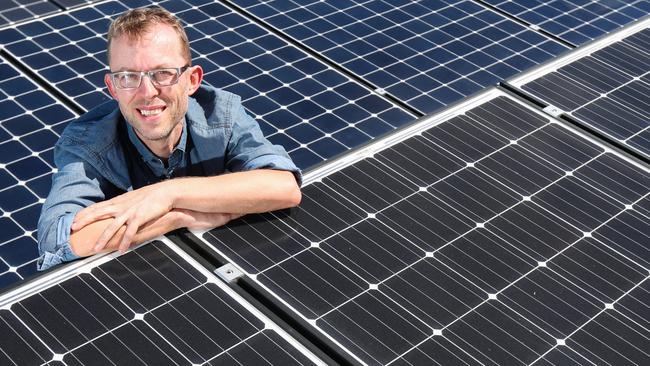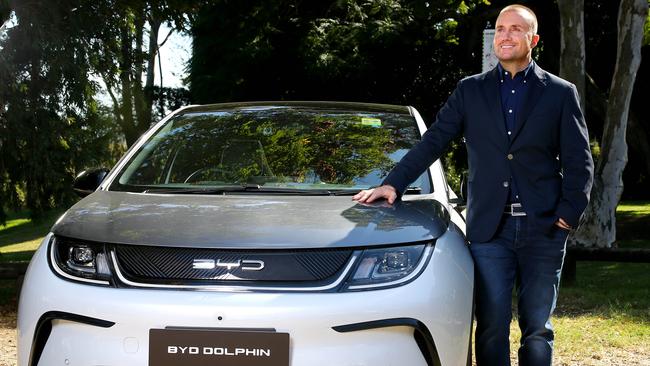Electric vehicles make more sense financially, but how much more?
Financial benefits and incentives are driving surging interest in EVs Australia. Watch our TV show and find out which ones are worth buying.
Motoring News
Don't miss out on the headlines from Motoring News. Followed categories will be added to My News.
Electric vehicles have evolved from a plaything of the rich and environmentally-conscious, as changes in prices, leasing, lower-interest loans and government incentives help them stack up financially for more motorists.
The economics of buying and owning an EV are more complex than a petrol vehicle, and it’s changing as cheaper models come onto the market.
Different states offer different rebates and discounts, the federal government’s fringe benefits tax exemption for EVs has become hugely popular on vehicle leases, and analysts agree that the more kilometres you cover in an EV the bigger the financial benefit.
Calculations by News Corp Australia have found that fuel-wise, driving a popular Australian car can cost more than $12.60 per 100km while a comparable EV can cost as low as $2.50 per 100km, based on using affordable charging stations.
Are you thinking about buying an EV? Watch our show Fully Charged above and have your say in the comments below:

Running costs are even cheaper if you have a solar system at home.
Electrical engineer and founder of solarquotes.com.au Finn Peacock said the home solar could power an EV at 2-3c per kilowatt hour (kWh), while fast-charging stations could cost 65c.
“You get home, plug it in and it’s fully charged in the morning,” said Mr Peacock, who has owned Tesla and Mini EVs for several years.
“You will never miss going to the servo and filling up with petrol every week,” he said.
Maintenance of an EV was generally cheaper, but some things were more costly, Mr Peacock said.
“In my experience you go through more tyres, and insurance can be more expensive,” he said.
Solar quotes has produced a free online calculator that allows users to compare total costs.
Sort My Money founder David Rankin has also examined EV costs and found people who drive low kilometres might still be better off with a petrol engine, and avoid the convenience cost of losing 20 minutes at a recharging station.
“Everybody says you can get a pie and a coffee, but you don’t always want a pie and a coffee when you refuel,” he said.
EVs are enjoying huge growth among business users as people pay for them with novated leases and pre-tax dollars, after the federal government scrapped fringe benefits tax on EVs and associated expenses in July 2022.
The National Automotive Leasing and Salary Packaging Association (NALSPA) reports that 20 to 25 per cent of all novated lease sales are now EVs, up from about one to two per cent
prior to the last election.
The Commonwealth Bank has noticed a big jump in EV financing.
“Electric vehicles were initially embraced by early enthusiasts who were prepared to pay higher prices for a more sustainable vehicle,” said CommBank general manager personal loans Joel Larsen.
“While the initial purchase price of EVs and hybrid cars can be higher, it’s clear there are benefits in the medium term especially against the backdrop of increased petrol prices,” he said.

“The appeal of EVs has been supported by the arrival of lower cost models to the Australian market, improved charging performance and infrastructure, and new incentives such as government rebates, tax exemptions and discounted EV finance.” An EV loan can charge 5.5 per cent interest, compared with 8 per cent for other vehicles.
The CEO of EV company BYD, Luke Todd, said people were yet to really discover the cost of living benefits of EVs.
“When purchased via salary sacrifice … it actually works out more cost-effective to buy the $40,000 electric vehicle than the $19,000 petrol vehicle over a four-year period,” he said.
“A lot of the customers that have come to us have done the research … and come to their own realisation that there is a cost saving.”
NEW LEASE ON LIFE
• The federal government’s tax breaks for EVs have been a game changer for employees and businesses, helping them save tens of thousands of dollars a year on EV novated leases.
• An exemption on fringe benefits tax for EVs was introduced in July 2022 and has sent lease activity soaring.
• The FBT exemption means all of a lease payment is made using pre-tax salary, and pre-tax dollars also can pay for other running costs including charging, servicing, registration, insurance, tyres and car washes.
• Banks are also offering low-interest loans for green vehicles. The CommBank has a 5.49 per cent rate for EVs, compared with 7.99 per cent for petrol vehicles. The reduced rate could save you more than $28,000 if you financed a $68,300 Tesla Model Y over seven years with no deposit.
More Coverage
Originally published as Electric vehicles make more sense financially, but how much more?





